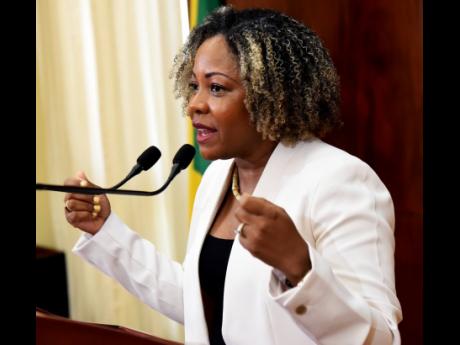Editorial | Morris Dixon’s pathway
Prime Minister Andrew Holness’ appointment of Senator Dana Morris Dixon as the information minister in this week’s minor shuffle of his Cabinet is a logical alignment of portfolios that could yield gains for the Government, if Dr Morris Dixon is not distracted from her path and how she has engaged over the past year.
In that regard, Dr Morris Dixon has to avoid two obstacles, one of which she has control over. She has to resist the kind of evolution that ultimately undid her predecessor, Robert Morgan, who has replaced Everald Warmington as the minister with responsibility for works in the Ministry of Economic Growth and Job Creation.
Put another way, Dr Morris Dixon must see her job as promoting and articulating the Government’s programmes and policies in ways that win them the widest possible buy-in. Not searching for, or seeing, enemies around every corner.
But perhaps more importantly, she must ensure – which is a pledge that she ought to demand from Prime Minister Holness – that her efforts are not undermined by the journalist-turned-hard partisan ideologue, Abka Fitz-Henley, who has been appointed a parliamentary secretary of the Office of the Prime Minister (OPM).
Mr Fitz-Henley’s role at the OPM has not been made clear. However, given his background, he is likely to be seen by the prime minister as a sounding board on information policy and communication matters – and as deputy, of a sort, to Dr Morris Dixon. But given Mr Fitz-Henley’s penchant for political scrap and his inclination to shoot from the hip, that, in the context of an administration undertaking major policy and potentially transformative projects, could be problematic.
Which is not to suggest that there ought not to be a place for Mr Fitz-Henley. It is just that he is likely to have brought greater value to the administration from the secretariat of the governing Jamaica Labour Party (JLP) than in government. Which is something that Mr Holness might still consider.
NO SIGNIFICANT POLICY WINS
The prime minister’s adjustment of the Cabinet is a direct fallout from the JLP’s less-than-stellar performance in February’s municipal elections, when it lost ground to the Opposition People’s National Party (PNP).
In the immediate aftermath of those elections, Everald Warmington – a man with an adolescent’s inability to manage emotions and toddler’s unawareness of boundaries contained in a septuagenarian’s body – was forced to resign after the latest of his long string of indiscretions. He was caught on video in an expletive-riddled screed, threatening not to channel state resources through a PNP local government councillor who had won one of the divisions in his South Western St Catherine constituency.
Mr Morgan also a lost division in his Central Clarendon constituency, where he had pre-election falling-outs with some JLP supporters. More recently, as the party began its post-mortem of the election results, Mr Morgan resigned as chair of the JLP public relations committee, apparently assuming some of the blame for the outcomes.
The irony with respect to Mr Morgan is that while the JLP was in opposition, before its return to Government in 2016, he emerged as an eloquent, measured and social media savvy spokesman for the party. He maintained that posture for a time during his 2016-2019 stint as Mr Holness’ director of communications.
More recently, though, Mr Morgan appeared to have lost his way, often delivering unnecessarily partisan tropes and ascribing political bias to almost every perceived unflattering report of government action. And unfortunately, he has had no significant policy wins since being made a minister in 2021.
That is the trajectory that Dr Morris Dixon must avoid. Which, by temperament, and on the evidence of her performance over the past year since joining the Cabinet with responsibility for skills and digital transformation, she appears quite capable of doing.
Working out of the OPM, Dr Morris Dixon’s job includes rolling out the Government’s National Identification System, streamlining efforts to expand vocational and skills training in Jamaica, and coordinating the Government’s interaction with the National Partnership Council and the Crime Monitoring and Oversight Committee.
Helped, no doubt, by her extensive stint in the private sector engaged in change management, she appears to have been an effective but, critically, calm and unprovocative minister. She does not rub people, including the Government’s opponents, the wrong way. That is an asset it would do Prime Minister Holness well to exploit.
In the meantime, in addition to her already-long to-do list, Dr Morris Dixon must accelerate the modernisation of the Access to Information Act, and well as begin a constructive engagement with traditional media about the havoc being wrought by the global digital hyperscalers, who vacuum away huge amounts of resources from Jamaica, while making no contribution to the national economy and putting at risk the survival of a crucial anchor of the country’s democracy.


